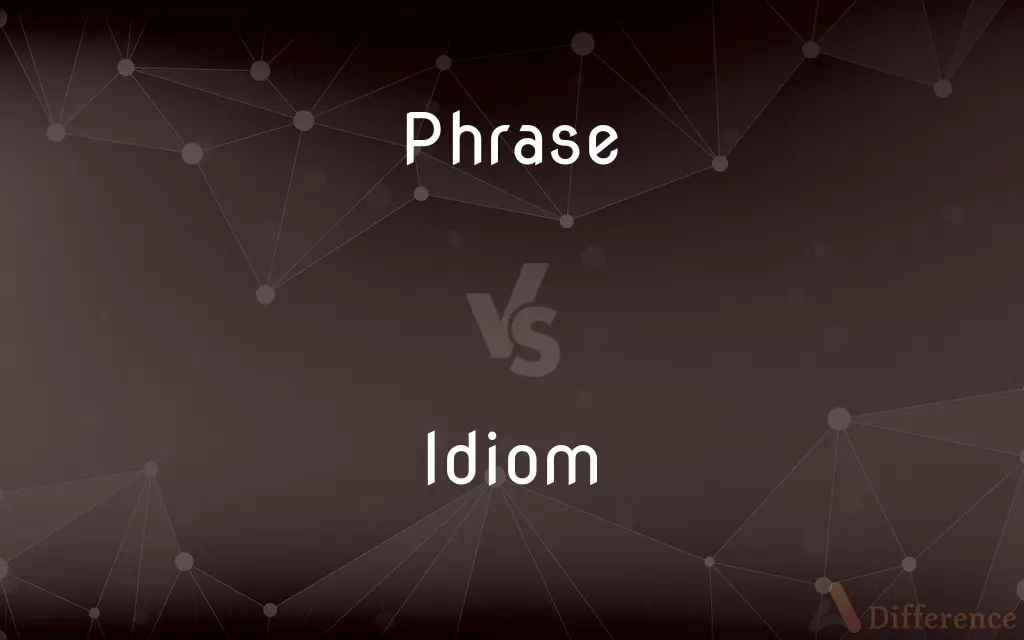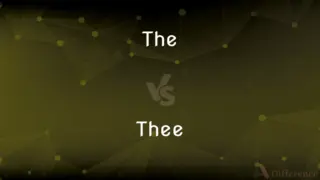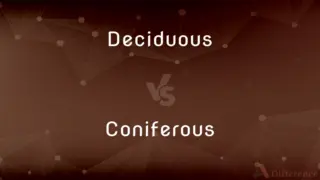Phrase vs. Idiom — What's the Difference?
By Tayyaba Rehman — Updated on October 28, 2023
A phrase is a group of words without a subject-verb predicate construction, while an idiom is a phrase with a meaning not deducible from its individual words.

Difference Between Phrase and Idiom
Table of Contents
ADVERTISEMENT
Key Differences
A phrase is fundamentally a collection of words that can work together but don't necessarily convey a complete thought. They can be short, long, descriptive, or straightforward. An idiom, on the other hand, is a specific type of phrase that has a meaning different from the literal interpretation of its words.
Consider the phrase "a bunch of flowers." It's a simple collection of words describing several flowers grouped together. In contrast, the idiom "kick the bucket" doesn't mean physically kicking a bucket; it's a colloquial way to say someone has died.
Another key difference lies in understanding. Phrases are often more straightforward and can usually be understood by considering the meanings of the individual words. Idioms, in contrast, can be puzzling to non-native speakers because their meanings often can't be deduced just by looking at the words they contain.
To elaborate further, phrases are versatile. They can be parts of sentences, acting as nouns, adjectives, or other parts of speech. Idioms are more rigid. Changing a word in an idiom can alter its meaning or render it nonsensical.
In essence, while all idioms are phrases, not all phrases are idioms. A phrase becomes an idiom when its meaning isn't directly related to the literal interpretation of the words within it.
ADVERTISEMENT
Comparison Chart
Definition
A group of words working together
A phrase with a non-literal meaning
Interpretation
Typically literal
Figurative or cultural
Alteration
Can often be altered without losing meaning
Changing a word can alter or void its meaning
Understanding
Understandable from individual words
Meaning often unrelated to individual words
Application
Parts of sentences, versatile
Specific, fixed expressions with unique meanings
Compare with Definitions
Phrase
A sequence of words intended to have meaning.
The phrase dark blue skies paints a visual image.
Idiom
An expression with a figurative meaning distinct from its literal words.
Bite the bullet is an idiom meaning to face a difficult situation.
Phrase
A small group of words standing together as a conceptual unit.
The phrase under the weather means feeling sick.
Idiom
A group of words whose meaning is not predictable from the meanings of its constituents.
Break a leg is an idiom wishing someone luck.
Phrase
Words that complement the main clause in a sentence.
After the rain stopped is a phrase indicating time.
Idiom
A characteristic mode of expression in music or art.
That song has a rock'n'roll idiom.
Phrase
Any short expression.
Once upon a time is a familiar opening phrase in stories.
Idiom
A form of expression natural to a language, person, or group.
Spill the beans is an idiom meaning to reveal a secret.
Phrase
In syntax and grammar, a phrase is a group of words which act together as a grammatical unit. For instance, the English expression "the very happy squirrel" is a noun phrase which contains the adjective phrase "very happy".
Idiom
Phrases used in a cultural context with unique meanings.
Kick the can down the road is an idiom meaning to delay a decision.
Phrase
A sequence of words that have meaning, especially when forming part of a sentence.
Idiom
An idiom is a phrase or expression that typically presents a figurative, non-literal meaning attached to the phrase; but some phrases become figurative idioms while retaining the literal meaning of the phrase. Categorized as formulaic language, an idiom's figurative meaning is different from the literal meaning.
Phrase
A characteristic way or mode of expression
An apt turn of phrase.
Idiom
A group of words established by usage as having a meaning not deducible from those of the individual words (e.g. over the moon, see the light).
Phrase
A brief, apt, and cogent expression
The phrase "out of the frying pan and into the fire.".
Idiom
A characteristic mode of expression in music or art
They were both working in a neo-impressionist idiom
Phrase
(Music) A short passage or segment, often consisting of four measures or forming part of a larger unit.
Idiom
A speech form or an expression of a given language that is peculiar to itself grammatically or cannot be understood from the individual meanings of its elements, as in keep tabs on.
Phrase
A series of dance movements forming a unit in a choreographic pattern.
Idiom
The specific grammatical, syntactic, and structural character of a given language.
Phrase
To express orally or in writing
The speaker phrased several opinions.
Idiom
Regional speech or dialect.
Phrase
To divide (a passage) into phrases.
Idiom
A specialized vocabulary used by a group of people; jargon
Legal idiom.
Phrase
To combine (notes) in a phrase.
Idiom
A style of artistic expression characteristic of a particular individual, school, period, or medium
The idiom of the French impressionists.
The punk rock idiom.
Phrase
To make or express phrases.
Idiom
A manner of speaking, a mode of expression peculiar to a language, language family, or group of people.
In English, idiom requires the indefinite article in a phrase such as "she's an engineer", whereas in Spanish, idiom forbids it.
Some of the usage prescriptions improved clarity and were kept; others that yielded discordant violations of idiom were eventually revised.
Phrase
(Music) To perform a passage with the correct phrasing.
Idiom
(programming) A programming construct or phraseology that is characteristic of the language.
Phrase
A short written or spoken expression.
Idiom
A language or language variety; specifically, a restricted dialect used in a given historical period, context etc.
In the idiom of the day, they were sutlers, although today they'd probably be called vendors.
Phrase
(grammar) A word or, more commonly, a group of words that functions as a single unit in the syntax of a sentence, usually consisting of a head, or central word, and elaborating words.
Idiom
An established phrasal expression whose meaning may not be deducible from the literal meanings of its component words.
She often spoke in idioms, pining for salad days and complaining about pots calling the kettle black.
Phrase
(music) A small section of music in a larger piece.
Idiom
An artistic style (for example, in art, architecture, or music); an instance of such a style.
The idiom of the expressionists
Phrase
(archaic) A mode or form of speech; diction; expression.
Idiom
The syntactical or structural form peculiar to any language; the genius or cast of a language.
Idiom may be employed loosely and figuratively as a synonym of language or dialect, but in its proper sense it signifies the totality of the general rules of construction which characterize the syntax of a particular language and distinguish it from other tongues.
By idiom is meant the use of words which is peculiar to a particular language.
He followed their language [the Latin], but did not comply with the idiom of ours.
Phrase
(dance) A short individual motion forming part of a choreographed dance.
Idiom
An expression conforming or appropriate to the peculiar structural form of a language.
Some that with care true eloquence shall teach,And to just idioms fix our doubtful speech.
Phrase
(transitive) To express (an action, thought or idea) by means of particular words.
I wasn't sure how to phrase my condolences without sounding patronising.
Idiom
A combination of words having a meaning peculiar to itself and not predictable as a combination of the meanings of the individual words, but sanctioned by usage; as, an idiomatic expression; less commonly, a single word used in a peculiar sense.
It is not by means of rules that such idioms as the following are made current: "I can make nothing of it." "He treats his subject home." Dryden. "It is that within us that makes for righteousness." M. Arnold.
Sometimes we identify the words with the object - though by courtesy of idiom rather than in strict propriety of language.
Phrase
To perform a passage with the correct phrasing.
Idiom
The phrase forms peculiar to a particular author; as, written in his own idiom.
Every good writer has much idiom.
Phrase
To divide into melodic phrases.
Idiom
Dialect; a variant form of a language.
Phrase
A brief expression, sometimes a single word, but usually two or more words forming an expression by themselves, or being a portion of a sentence; as, an adverbial phrase.
"Convey" the wise it call. "Steal!" foh! a fico for the phrase.
Idiom
A manner of speaking that is natural to native speakers of a language
Phrase
A short, pithy expression; especially, one which is often employed; a peculiar or idiomatic turn of speech; as, to err is human.
Idiom
The usage or vocabulary that is characteristic of a specific group of people;
The immigrants spoke an odd dialect of English
He has a strong German accent
Phrase
A mode or form of speech; the manner or style in which any one expreses himself; diction; expression.
Thou speak'stIn better phrase and matter than thou didst.
Idiom
The style of a particular artist or school or movement;
An imaginative orchestral idiom
Phrase
A short clause or portion of a period.
Idiom
An expression whose meanings cannot be inferred from the meanings of the words that make it up
Phrase
To express in words, or in peculiar words; to call; to style.
Phrase
To use proper or fine phrases.
Phrase
An expression forming a grammatical constituent of a sentence but not containing a finite verb
Phrase
A short musical passage
Phrase
An expression whose meanings cannot be inferred from the meanings of the words that make it up
Phrase
Put into words or an expression;
He formulated his concerns to the board of trustees
Phrase
A segment of language that forms a grammatical unit.
The phrase in the park describes a location.
Common Curiosities
How is an idiom different from a regular phrase?
An idiom has a meaning not directly related to the literal meanings of its words.
Do all idioms lack a literal meaning?
Most idioms have a figurative meaning distinct from their literal interpretation.
What's a basic definition of a phrase?
A phrase is a group of words working together without a subject-verb predicate construction.
Can the words in an idiom be changed without altering its meaning?
Typically no, changing words in an idiom can change or void its meaning.
Why are idioms often confusing for non-native speakers?
Because their meanings often aren't deducible from their individual words.
Do idioms exist in written language or just spoken language?
Idioms exist in both written and spoken language.
Can a phrase become an idiom?
Yes, if its usage evolves to carry a specific non-literal meaning, it can become an idiom.
How do you determine the meaning of an idiom?
Context often helps, but sometimes cultural or historical knowledge is needed.
Are idioms universal across languages?
No, idioms often have cultural roots and may not directly translate across languages.
Are there idioms in other forms of expression, like music?
Yes, the term "idiom" can also refer to a characteristic mode of expression in music or art.
Can the meaning of an idiom change over time?
Yes, like other language elements, idioms can evolve and their meanings can shift.
Can a phrase have a figurative meaning?
While phrases can be metaphorical, if their meaning is distinct from their literal words, they become idioms.
Can a phrase be part of a sentence?
Yes, phrases can act as nouns, adjectives, or other parts of a sentence.
Are idioms consistent across all dialects of a language?
Not always. Some idioms are specific to certain regions or dialects.
What makes a group of words a phrase?
A phrase is a group of words that function as a single unit in syntax.
Share Your Discovery

Previous Comparison
The vs. Thee
Next Comparison
Deciduous vs. ConiferousAuthor Spotlight
Written by
Tayyaba RehmanTayyaba Rehman is a distinguished writer, currently serving as a primary contributor to askdifference.com. As a researcher in semantics and etymology, Tayyaba's passion for the complexity of languages and their distinctions has found a perfect home on the platform. Tayyaba delves into the intricacies of language, distinguishing between commonly confused words and phrases, thereby providing clarity for readers worldwide.















































